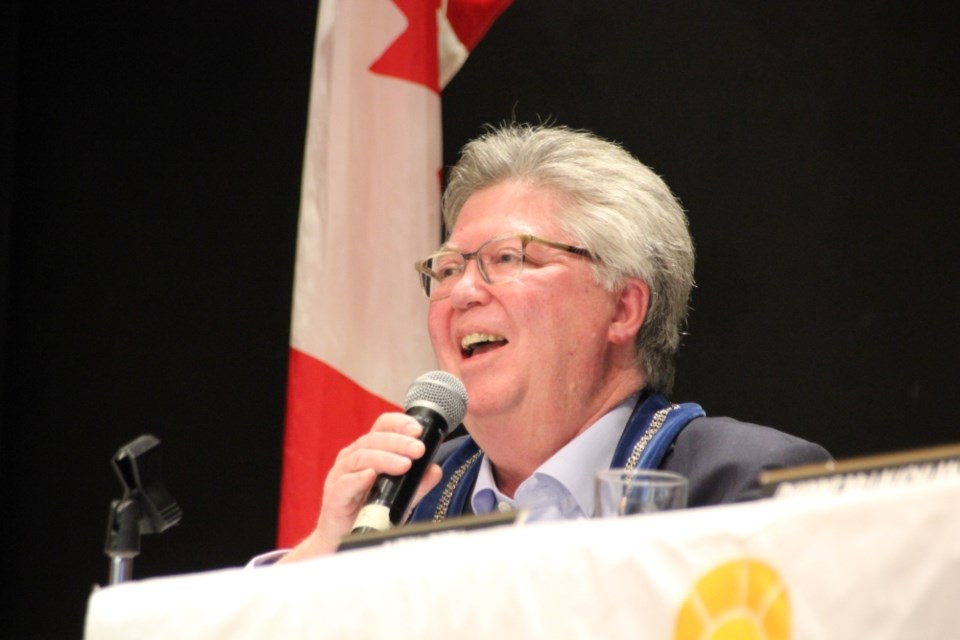Editor's note: This story was originally published Sept. 23 and was updated Sept. 25 to add comments from Sechelt Mayor John Henderson.
shíshálh Nation Council released dual statements Friday, one thanking Sechelt council for standing with the Nation and survivors of residential schools, the second denouncing the Sechelt mayor for not rejecting residential school denialism and calling for him to “step aside.”
In early September, Sechelt council endorsed a Union of BC Indian Chiefs (UBCIC) resolution, “Rejection of Residential School Denialism,” without the support of the mayor. At the same meeting, it was revealed that Mayor John Henderson had a book the UBCIC calls “racist misinformation” in municipal hall and was discussing it with senior staffers.
“The truth of what happened in Residential Schools in this country, including at St. Augustine’s in Sechelt, is well documented,” the Nation’s letter addressed to Henderson said. “Our courageous survivors have told us the truth and the truth must be heard, understood, and accepted before reconciliation can occur in this country. We stand with our survivors and denounce your actions.”
In not supporting the UBCIC resolution and refusing to reject residential school denialism and misinformation, Henderson “puts the District of Sechelt’s reconciliation efforts at risk,” said the letter. It goes on to ask him to step aside.
“At this important time in Canadian history, we need courageous and thoughtful leaders who are able to bring together Indigenous and non-Indigenous Peoples and individuals alike to build a better future for all,” the letter concludes. “We do not believe that you are capable of this kind of leadership or that you are fit to hold the important office of the Mayor of Sechelt. We call on you to immediately step aside and let someone who can meet this challenge take the chair.”
The letter asks the mayor to direct all future communications with the Nation through his councillor colleagues, who received their own letter, thanking them for their support of the UBCIC’s resolution.
“Residential School denialism and misinformation has no place in our society,” says the letter to Sechelt council. “It retraumatizes survivors and their families causing further challenges on the path to healing and reconciliation. We must be honest about our past and see it clearly before we can move forward together.”
Context
The UBCIC resolution – unanimously endorsed by the Chiefs Council in June – came by way of a letter last month specifically addressed to the councils of Powell River, West Vancouver, Sechelt, Kamloops and Quesnel, as well as all B.C. municipalities. The resolution calls on all levels of government and the public to reject residential school denialism, to uphold the findings and reports of the Truth and Reconciliation Commission (TRC), to implement the TRC’s 94 calls to action, to advance policies acknowledging and taking responsibility for the “history and harmful legacy of residential schools” and to support healing for survivors.
The UBCIC letter continues to say the organization “rejects any and all Residential School racist denialism and ardent dissemination of racist misinformation put forward by the authors of Grave Error – How the Media Misled Us and perpetuated by members of the public and elected officials.”
Grave Error is a collection of essays published last December, which accuses the media of perpetuating a false narrative of residential schools and questions the findings of the Truth and Reconciliation Commission.
Henderson's response
Asked for comment, District of Sechelt communications manager Lindsay Vickers said the municipality doesn’t have a statement at this time, but that they anticipate something will come forward following Wednesday’s council meeting, when council is set to receive the correspondence.
Speaking to Coast Reporter Tuesday, Henderson called the letters “hurtful.” Clarifying that he was speaking on his own behalf and not on council’s, he reiterated that he is not a residential school denier. “I've never denied the residential school system. I know it caused tremendous trauma, and worse, for students and their families. I accept that it's had serious impacts on the descendants.”
“I’ve listened to survivors tell their stories, share their truths. I've been honored that they've listened to some of the experiences that some of my family have had, the unbelievable suffering as a POW, not me, of course, but…one of my extended family endured,” said Henderson. “It's that sort of sharing that I think is at the core of how we find common ground.”
Henderson said he wants to understand what it is about Grave Error in particular that makes it “considered to be so inappropriate” and would welcome conversations.
Henderson said he finds it “deeply sad” to receive the letters “without any effort on the part of the Union of British Columbia Indian Chiefs or [shishalh Nation lhe hiwus yalxwemult Lenora Joe], to reach out to me."
“It's not the way to move forward to where it's reconciliation in my view.”
Henderson said he has not reached out to the lhe hiwus, pointing to a busy week and figuring out how not to escalate the issue.
Henderson said he is not stepping aside and that he’s announcing he intends to run in the next election.
“I was elected by the taxpayers of Sechelt and I've got a mandate. I know that some of what I'm doing is ruffling, well, I don't want to be trite, some of what I'm doing is causing difficulties for some people, but I'm getting a lot of people encouraging me to keep going.”


